How three by-election wins shaped Labour's victory

Keir Starmer spearheaded Labour's return to power following the party's disastrous results in the 2019 election
- Published
As the streamers are swept up and the bunting taken down, it would be easy for Labour supporters to think their victory this week was inevitable.
But in 2021, party leader Sir Keir Starmer was under severe pressure with question marks over his future.
He faced what, for some, was a make-or-break by-election in Batley and Spen. That and two subsequent Yorkshire votes help illustrate Labour's rise to power.
2021: Hartlepool, Batley and Galloway
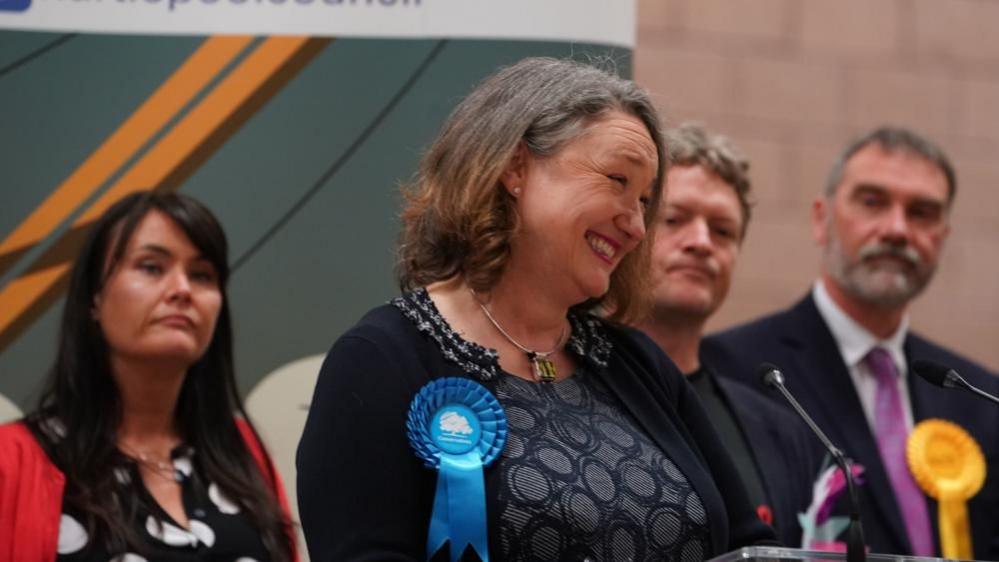
Jill Mortimer and the Conservatives overturned history to snatch Hartlepool from Labour
When Conservative Jill Mortimer racked up a majority of more than 7,000 votes in the Hartlepool by-election things did not look good for Labour or Sir Keir.
The party, in opposition since 2010, had pledged to change - but voters either didn't want to hear it or believe it.
Ms Mortimer became the first Tory to win in Hartlepool since the constituency was created in 1974.
Labour lost control of eight councils in the local elections on the same night, with the mood among party MPs said to be "febrile".
In the same set of elections, then Batley and Spen MP Tracy Brabin became mayor of West Yorkshire, meaning her seat was vacant and a by-election was needed.
Kim Leadbeater, Labour's candidate, was a well-known figure in the area having lived there her whole life.
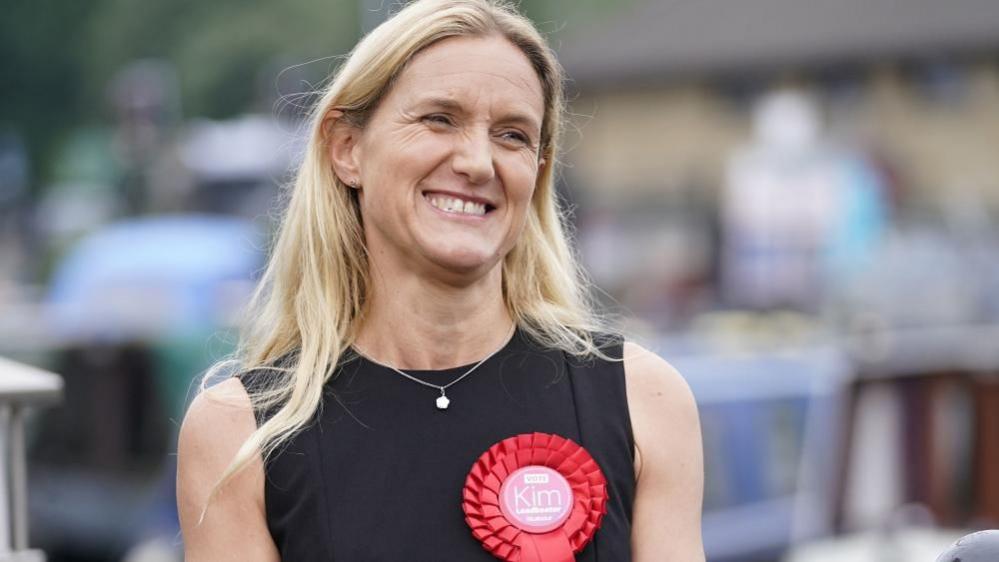
Kim Leadbeater was all smiles on the campaign trail, which had a few tense moments
She is also the sister of Jo Cox, the MP who was murdered by a far-right extremist whilst taking part in constituency work in June 2016.
Ms Leadbeater was promoted throughout the campaign as a "community champion" rather than a conventional politician.
Labour strategists also knew a second by-election defeat would inevitably call Sir Keir's leadership into question.
Inside the Labour camp, the party was fearful that rival candidate George Galloway could sway South Asian voters in particular, with protest votes potentially handing victory to the Conservatives.
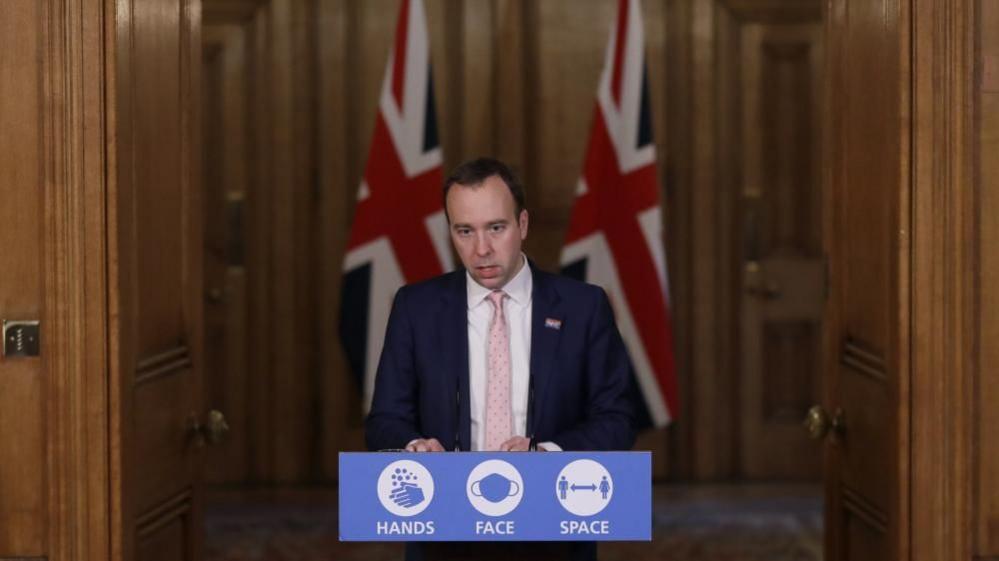
Matt Hancock admitted not following his own advice with an aide
The weekend before the vote, pictures of former Conservative Health Secretary Matt Hancock breaking Covid social distancing rules and kissing his aide were published.
Speaking to Conservatives on the ground at the time, they acknowledged it had seriously dinted support.
The Labour campaign went into overdrive on the streets of the constituency, with large numbers of campaigners there to rally their vote.
After a long night at the count, Ms Leadbeater was victorious with a majority of just 323 votes and Sir Keir made his way to West Yorkshire for a press call with his new MP.
Dr Anna Sanders, a British politics expert, says as well as Ms Leadbeater, the Labour leader's competence was also voted on that night.
The party won, despite a 3% swing away from Labour to the Conservatives.
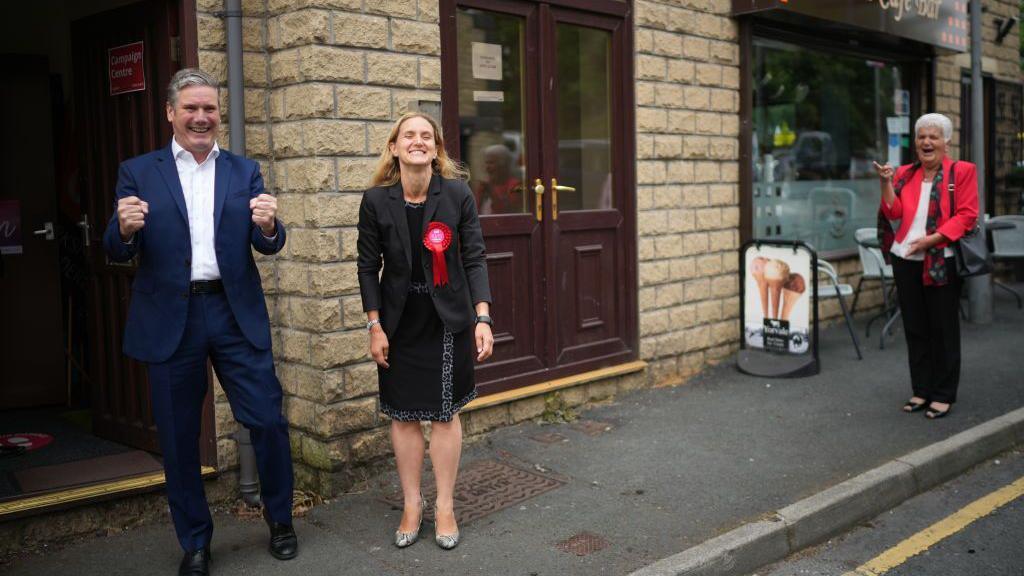
It was a celebratory mood in Batley and Spen for Labour after a narrow by-election victory
"Looking at the swing tells us the rate at which voters are moving from one party to another," the University of York lecturer says.
"What we actually saw was that Labour performed slightly worse at that by-election."
Sir Keir said Batley and Spen showed Labour could win in difficult circumstances, but said turning the party around after Jeremy Corbyn's 2019 defeat was a "slow, long hard road".
The win, however narrow, had bought him time.
2022: Partygate, scandals and Wakefield
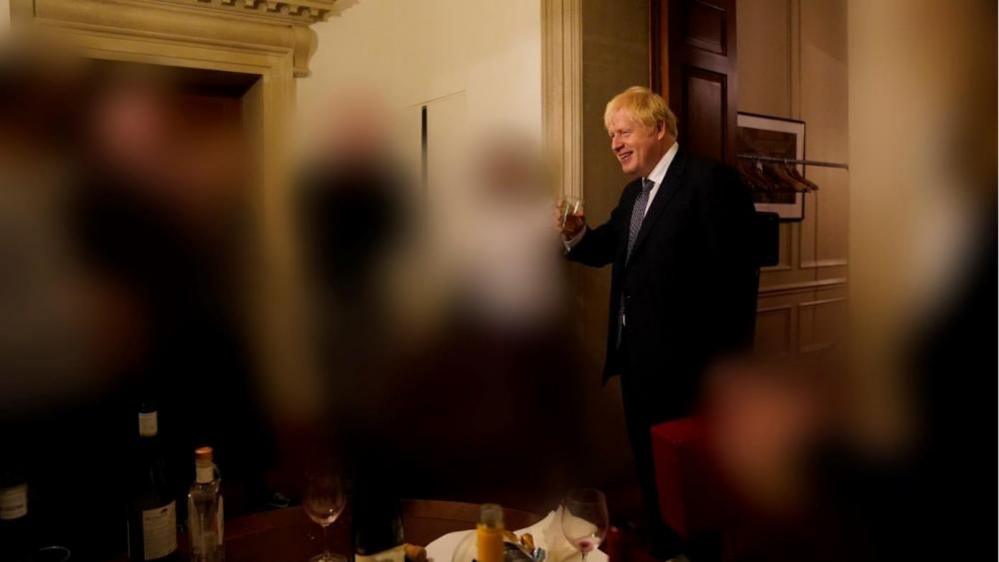
The Partygate scandal had broken and dented some reputations when the Wakefield vote took place
Wakefield had been one of those so-called Red Wall seats snaffled by the Conservatives in 2019.
The by-election came about after the Conservative MP, Imran Ahmad Khan, was found guilty of sexually assaulting a 15-year-old boy in 2008 and subsequently jailed.
The vote was held almost a year after Batley and Labour insiders said Sir Keir had been given 12 months to change the party
In the winter of 2021 reports of Covid rule-breaking parties at the heart of government during the pandemic began to emerge.
Fast forward to April 2022.
Then Prime Minister Boris Johnson and Chancellor Rishi Sunak had both received fixed penalty notices for breaking Covid rules.
The "Partygate" scandal would hang heavily over this by-election, which was run in tandem with one in Devon, where the sitting Conservative Tiverton and Honiton MP Neil Parish had been forced to resign after admitting watching pornography in Parliament.
Wakefield was flooded with senior Labour figures including the leader, deputy leader Angela Rayner and shadow chancellor Rachel Reeves.
The backdrop of Partygate meant Mr Johnson did no major public media events and other high-profile Conservatives campaigned away from the glare of the cameras.

Labour deputy leader was one of many senior Labour figures who campaigned in Wakefield
The election took place on 23 June 2022 and Labour's Simon Lightwood received 13,166 votes, with the Tory candidate recording 8,241 - a 12.7% swing from Conservative to Labour.
In the wake of the by-election, Conservative party chair Oliver Dowden resigned taking responsibility for the campaign.
Victor Mr Lightwood says he thinks Labour had "changed for the better" by the time of the by-election with Dr Sanders saying the "real anger" over Partygate translated into a diminished Conservative vote.
"Scandals like Partygate or MPs being accused of sexual offences damage the competence of the party, and competence is really important for how voters evaluate parties, so scandal after scandal can really damage votes," she adds.

Simon Lightwood, right, received a visit from Sir Keir Starmer after the by-election victory
Within a fortnight, amid another Conservative sexual misconduct scandal, Rishi Sunak resigned as chancellor and Sajid Javid resigned as health secretary.
Their moves triggered mass resignations across government and, ultimately, led to Boris Johnson having to step down as prime minister.
2023: Two Keirs, strategy and Selby
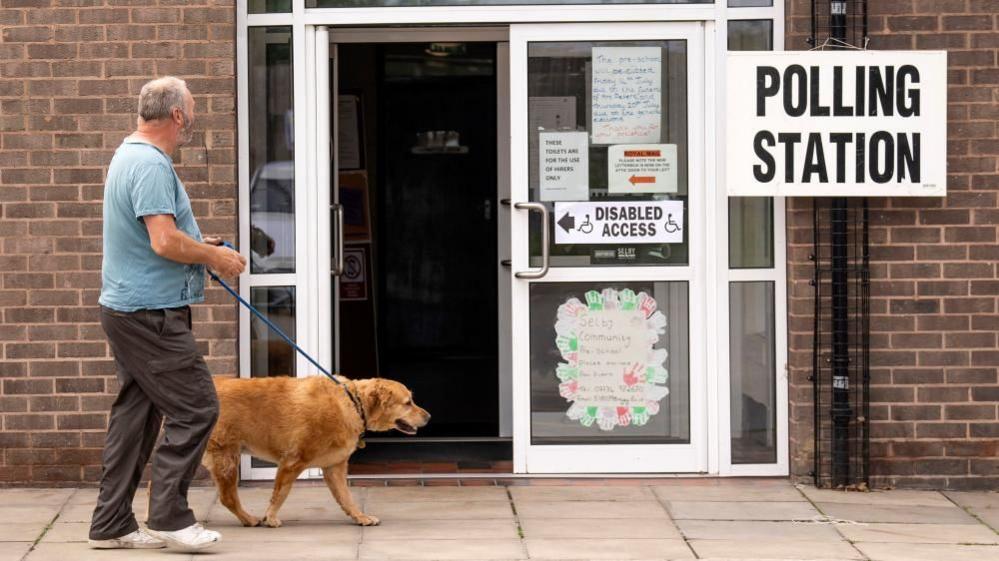
Labour needed to overturn a Conservative majority in excess of 20,000 votes in Selby and Ainsty
The Selby and Ainsty by-election was triggered when Nigel Adams, a close ally of Boris Johnson, announced his resignation.
A more confident Labour machine reacted almost immediately - despite facing a Conservative majority of more than 20,000.
Within hours, they had campaigning boots – in big numbers – on the ground with party strategists not far behind.
The constituency began to receive regular attention in the form of visits by Labour names.
The Conservatives responded, getting their own people out in decent numbers early on, including Mr Sunak.
Liam Fox, a former foreign secretary, was spotted knocking on doors.
But they were always outnumbered by Labour and the blue presence seemed to fade a little as the campaign continued.

Keir Mather, then 25, on the campaign trail
There was a classic by-election moment when local Tory activists were waiting outside Selby station for one of their big names to arrive and began cheering.
Instead, out strolled Labour leadership duo Sir Keir and deputy Ms Rayner.
Both sides laughed it off.
Labour's candidate had a story - it was his age.
Keir Mather, named after Labour Party founder Keir Hardie, was just 25.
He'd enjoyed a brief career after leaving Oxford with a first-class degree in history and politics.
Polling day in Selby town centre was a sea of red and yellow, with former Conservative MP for Scarborough and Whitby Sir Robert Goodwill seen wading his way through it outside Selby Abbey.
As 20 July turned into 21 July it became increasingly clear that Labour was gobbling up the Tory majority which, to many, had seemed unsurmountable.
Labour polled 16,456 to the Conservatives' 12,295 - a swing of more than 23%.
In the street the BBC interviewed Mr Mather's mother who said she had seen him on TV.
When asked whether he could be a future prime minister, she replied: "Never, say never."
There were several reasons for Labour’s win in Selby and Ainsty, including the prevailing political winds and Conservative voters staying at home in significant numbers.
But a base for that victory was undoubtedly built on Labour’s speed and strength in that all-important ground war.
Dr Sanders says by this time Labour had made real strides internally as well as "winning over the public".
Describing the result as "historic", she adds: "To go from just scraping by-election results in 2021 to having by-election results that produce the second largest swing for the party is really quite, quite remarkable."
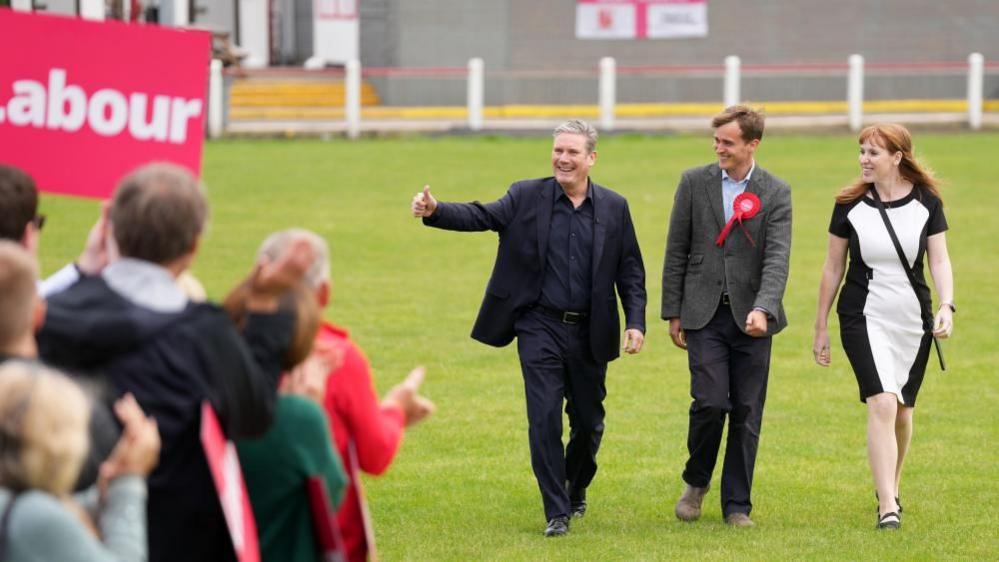
Pitch perfect? Keir Mather, centre, celebrates with Sir Keir Starmer and Angela Rayner at Selby Town football club
The scene for Labour's celebration also foreshadowed what we saw during the general election campaign.
Rather than a glitzy hotel, local community centre or pints at the pub, the party followed its strategy of utilising local non-league football grounds.
Northern Counties East League's Selby Town ground had some people on the pitch.
They didn't think then the campaign to win power was all over - but it is now.